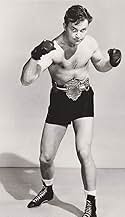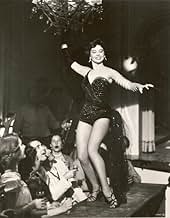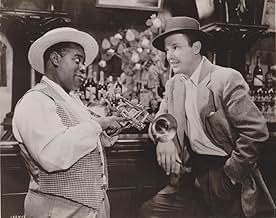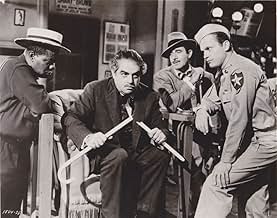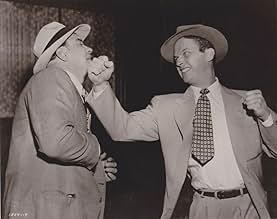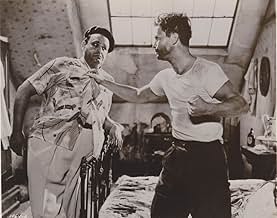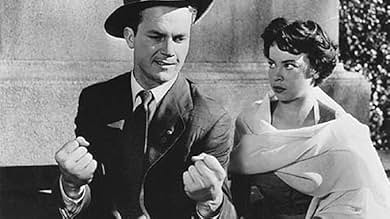Adicionar um enredo no seu idiomaAn about-to-retire New Orleans newspaper columnist tells the story of a most unforgettable character: boxer Socks Barbarossa.An about-to-retire New Orleans newspaper columnist tells the story of a most unforgettable character: boxer Socks Barbarossa.An about-to-retire New Orleans newspaper columnist tells the story of a most unforgettable character: boxer Socks Barbarossa.
- Fighter
- (não creditado)
- Waiter
- (não creditado)
Avaliações em destaque
So the story of Socks is the plot, and oh what a tangled mess it is. First, Socks is supposed to be heading for the championship in the ring, but one night he just runs away before the fight even starts. He says he is quitting, and will not say why. This is apparently enough for his blind backer, the Judge (Kurt Kasnar), to turn from friend to enemy. Every time he sees the guy he practically hisses and spits on him Come to think of it, I think he does spit on him. Socks is in love with Angie, the Judge's daughter (Leslie Caron), and she wisely postpones their wedding because married women can't work burlesque, which is what she has been doing and Socks is not trained to do anything but fight.
So Socks hits the skids for awhile, drinking his troubles away, and then joins the army and goes to Korea where he wins the Congressional medal of honor. He comes back, feted by military brass and the political elite of New Orleans, but after awhile he is forgotten again. So he picks up where he left off before Korea, whining endlessly about how bad he has it. I think he was going for the Frank Sinatra, "I'd-have-no-luck-if-it-wasn't-bad" vibe, but Meeker just plays this like a 20-something that never grew up. He lacks Sinatra's ability to project an interesting melancholy mystique.
I'll let you see how this film meanders to its confusing conclusion. It is probably worth a look for a few reasons that have nothing to do with the main character or the plot. For one you have musical interludes featuring the musical talent of the great Louis Armstrong and the dancing of Leslie Caron who does the best she can with a part in which she is completely miscast. Also, the film does have great atmosphere. You feel like you are on the gritty rain soaked streets of New Orleans back before it became riddled with crime and was just full of characters. You can almost hear Marlon Brando tear his tee shirt while crying "Stella!" somewhere out there in the French quarter.
Thus it's a 50/50 proposition as to whether it is worth your time.
Then we have Leslie Caron as his love interest. It looks like this part was hurriedly re-written for her after her triumph in AN American IN Paris. She performs ridiculous ballet routines in a seedy bar (you know the patrons would have booed her off immediately). You see she wanted to be a ballerina, but she gave it all up to support her blind father. He's played by Kurt Kaszner - an actor still in his thirties but donned with silly silver hair to make him look ancient and wise.
Then there's Louis Armstrong, sadly named "Shadow", and seemingly the only African-American in New Orleans. He's supposed to be Meeker's trainer, but he spends the whole movie playing his trumpet and leading absurd sing-a-longs at the local bar. He does have a couple of good acting scenes though. The excellent Gilbert Roland floats around the film's edges with nothing to do, while John McIntire adds pseudo profound narration to the story - told in flashback like a film noir.
Probably the worst sequence in the film, and that's saying something, is the ludicrous Korean War scene, with some stock footage, four soldiers, some sort of pine forest and a rear projected bridge deemed sufficient to portray a major world conflict.
So we have a boxing picture, a musical, a film noir, a war film, and a pseudo-Freudian psychological study all rolled into one! What more could you ask for?
It's hard to believe a fine hard-boiled director like Raoul Walsh oversaw this mess - he probably wanted to run straight back to Warner Bros afterwards.
Ralph Meeker. Best remembered as Mike Hammer in Kiss Me Deadly, he caught the studio's eye when he replaced Marlon Brando on Broadway as Stanley Kowalski in A Streetcar Named Desire. On the off-chance that the N'Awlins setting might work its voodoo once more, the brawny Meeker was cast as a prizefighter called Socks Barbarossa.
Leslie Caron. Fresh from An American in Paris, she was at best a dancer with a Gallic accent and gamine charm. Here, she supports her blind father (Kurt Kaszner) by kicking (en point, no less) in hoochie-koochie numbers in a dive called Chez Bozo; it's a cross between Harriet Hoctor and Mary Tyler Moore as Laura Petrie, dancing in Capris.
Louis Armstrong. Instead of turning him into a jazz-joint headliner, he's relegated to the part of a philosophizing guide for the sightless old grump; thankfully, he sings a few songs and blows his horn now and again.
All in all, Glory Alley is a Runyonesque slice of life set among the poor people of the Big Easy. Meeker, in love with Caron but hated by her father, sustains a none-too-plausible run of ups and downs (there's even an excursion to Korea). It's a pot-luck special, made (it seems) to clear out the studio's larders.
Você sabia?
- CuriosidadesNone of the songs performed in the film are listed in the on-screen credits. In addition to the songs Louis Armstrong performed in the film, he recorded another song, "It's a Most Unusual Day," by Jimmy McHugh and Harold Adamson, but it was cut. That outtake, several songs from this film, plus songs from other Louis Armstrong M-G-M films, were included on a CD anthology entitled "Now You Has Jazz: Louis Armstrong at M-G-M," released in 1997 by Rhino Records.
- Erros de gravaçãoAt the 40 minute mark, Angie begins reading a letter from Socks. As she holds up the one-page letter, it is clear that there is no writing on the back of the letter. However, she turns the letter over and seems to be reading the back of the letter. After dancing in the living room, she picks up the letter again, and the entire front page is visible, and one can see that the entire letter is written on the front page only.
- Citações
Gabe Jordan: Politicians aren't New Orleans. For the real story you gotta go to the - real people. The people of desire on Piety Street. The people of piety on Desire Street. And the people of good intentions on Bourbon Street. My street. My favorite beat. It has more grifters, grafters, guzzlers, and guts than any other street in the world. Buccaneers Alley, Thieves Alley, and this stretch, the block I call Glory Alley. Glory Alley - a world of square guys with round edges. Where love with larceny, courage and crime, nobility and amorality, come out of the same barrel. Beer barrel or whiskey barrel, preferably bourbon. Life is fundamental to mugs, pugs, and lugs. You settle it with fists or rationalize it with dreams out of a bottle. Yet, in the bottom of life's gutter, you can find, if you look up hard enough, more beauty, dignity and sensitivity, than anywhere else in the world. Has beens, might have beens, never was it, and - champions.
- ConexõesEdited from Modern New Orleans (1940)
- Trilhas sonorasGlory Alley
(uncredited)
Music by Jay Livingston
Lyrics by Mack David
Sung by chorus over opening credits and at the end
Principais escolhas
Detalhes
- Data de lançamento
- País de origem
- Idioma
- Também conhecido como
- El callejon de la gloria
- Locações de filme
- Empresa de produção
- Consulte mais créditos da empresa na IMDbPro
Bilheteria
- Orçamento
- US$ 971.000 (estimativa)
- Tempo de duração1 hora 19 minutos
- Cor
- Proporção
- 1.37 : 1
Contribua para esta página


